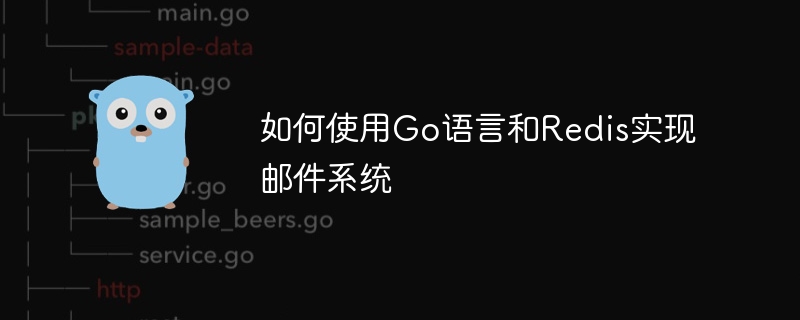Home >Backend Development >Golang >How to implement a mail system using Go language and Redis
How to implement a mail system using Go language and Redis
- PHPzOriginal
- 2023-10-28 09:58:561505browse

How to use Go language and Redis to implement an email system
In today's Internet era, the email system is one of the important tools for people to conduct private and business communications. This article will introduce how to implement a simple email system using Go language and Redis, and provide specific code examples.
1. Introduction to Go language
Go language is an open source programming language developed by Google, aiming to provide high-performance and efficient programming support. The Go language has the characteristics of simple syntax, high concurrency performance, and rich standard libraries. It is suitable for scenarios such as developing distributed systems and high-concurrency services.
2. Introduction to Redis
Redis is an open source in-memory data storage system that supports various data structures, such as strings, hashes, lists, sets, and ordered sets. Redis has the characteristics of high performance and low latency, and is suitable for application scenarios such as caching, real-time computing and message queues.
3. Implementation steps
- Build the Go language environment and install Redis
Before starting, you need to build the Go language development environment locally and install Redis . You can refer to the documentation on the Go official website and the Redis official website for installation and configuration.
- Create the basic structure of the email system
In the Go language, you can use struct to define the basic structure of the email, such as sender, recipient, subject and Content etc. The sample code is as follows:
type Email struct {
Sender string
Recipient string
Subject string
Content string
}- Write an email sending function
Using the Redis client library of Go language, you can connect to the Redis server and perform related operations. Here, you can define a function to send emails and save the email information to Redis. The sample code is as follows:
func sendEmail(email Email) error {
// 连接Redis服务器
client := redis.NewClient(&redis.Options{
Addr: "localhost:6379",
Password: "",
DB: 0,
})
// 将邮件信息保存到Redis中
err := client.HMSet(email.Sender, map[string]interface{}{
"recipient": email.Recipient,
"subject": email.Subject,
"content": email.Content,
}).Err()
if err != nil {
return err
}
return nil
}- Write an email receiving function
Similarly, you can define a function to receive emails and read the email information of the specified sender from Redis. , and returned to the caller. The sample code is as follows:
func receiveEmail(sender string) (Email, error) {
// 连接Redis服务器
client := redis.NewClient(&redis.Options{
Addr: "localhost:6379",
Password: "",
DB: 0,
})
// 从Redis中读取邮件信息
result, err := client.HGetAll(sender).Result()
if err != nil {
return Email{}, err
}
email := Email{
Sender: sender,
Recipient: result["recipient"],
Subject: result["subject"],
Content: result["content"],
}
return email, nil
}5. Summary
Through the cooperation of Go language and Redis, we can implement a simple email system. First, we used the Go language to define the basic structure of the email and wrote the functions for sending and receiving emails. Then, save the email information through Redis and use Redis's functions to retrieve the email. In this way, we can implement a basic mail system. Of course, in practical applications, we can further improve the functions of the email system, such as adding email sending queues and error handling mechanisms.
The above is the relevant introduction and code examples of using Go language and Redis to implement the mail system. I hope this article can be helpful to you, thank you for reading!
The above is the detailed content of How to implement a mail system using Go language and Redis. For more information, please follow other related articles on the PHP Chinese website!

